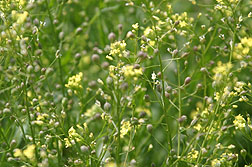 Researchers at several universities are looking at the potential camelina has as a feedstock for biodiesel or even using the oil as a straight drop-in fuel. This news release from Kansas State University says Timothy Durrett, assistant professor of biochemistry and molecular biophysics at KSU, has joined researchers from Colorado State University, the University of Nebraska, Lincoln and the University of California, Davis, in using a $1.5 million joint U.S. Department of Agriculture and Department of Energy grant to see how to get the most out of a promising crop: Camelina sativa.
Researchers at several universities are looking at the potential camelina has as a feedstock for biodiesel or even using the oil as a straight drop-in fuel. This news release from Kansas State University says Timothy Durrett, assistant professor of biochemistry and molecular biophysics at KSU, has joined researchers from Colorado State University, the University of Nebraska, Lincoln and the University of California, Davis, in using a $1.5 million joint U.S. Department of Agriculture and Department of Energy grant to see how to get the most out of a promising crop: Camelina sativa.
Camelina, a nonfood oilseed crop, can be a valuable biofuel crop because it can grow on poorer quality farmland and needs little irrigation and fertilizer. It also can be rotated with wheat, Durrett said.
“Camelina could give farmers an extra biofuel crop that wouldn’t be competing with food production,” Durrett said. “This research can add value to the local agricultural economy by creating an additional crop that could fit in with the crop rotation.”
The research will take advantage of the recently sequenced camelina genome. For the project, Durrett is improving camelina’s oil properties and by altering the plant’s biochemistry to make it capable of producing low-viscosity oil.
The article says developing a low-viscosity oil is crucial to improving biofuels and could allow camelina oil to be able to be dropped in as a fuel without any kind of chemical modification.

